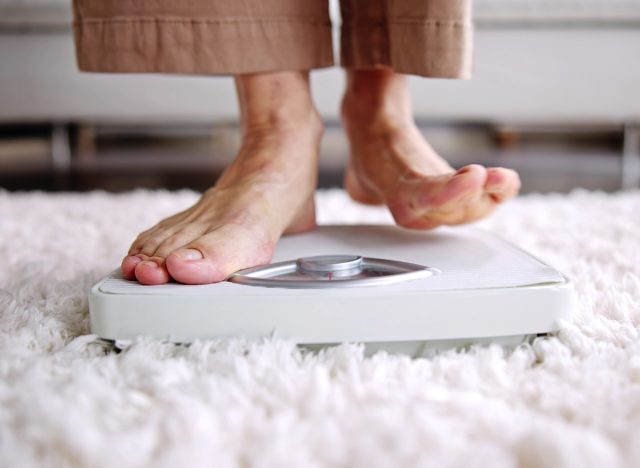8 Signs You Are Actually Losing Weight
Mario Tomic is a social media influencer and fitness expert who shares "nutrition, exercise, mindset, and personal development tips to help you get leaner, stronger, and happier" on his popular YouTube channel. In one of his many viral videos, he reveals some of the signs to look out for if you are actually losing weight. "Creating a calorie deficit and sustaining that deficit over time is one of the key principles for getting lean. And whichever method you use, whether it's keto, paleo, low carb, low fat, intuitive eating, or tracking your calories and macros, the method has to put you in a calorie deficit in order for you to maximize fat loss," he says.
These Tips Will Help You Get on the Right Track
"Some of these signs I haven't seen other people talk about," he says in the clips. "And what I'd like you to do is to be able to recognize them so you can see if you are on the right track or if you need to make changes to your approach."
Sign 1: You See Changes in Your Body Weight Averages

The first sign that you are in a calorie deficit, is "seeing changes in your body weight averages," he says. "In other words, if your average weight across several weeks hasn't gone down, then by definition, you have not created a calorie deficit. This is one of the most important signs. The reason why I'm saying several weeks instead of a couple of days is because fat loss is not linear, and water retention can cause the scale weight to plateau. But if you take your daily wanes and then average the highs and lows over the course of two to three weeks, you'll be able to tell whether you've truly created that calorie deficit. And if you notice that after, let's say three weeks, you've been on a plateau, well then it's time to look at making some changes or your overall diet consistency."
Sign 2: A Shift in Hunger and Taste
The second you may notice? A shift in your hunger and taste. "Your meals become less filling compared to before, and you're getting hungrier sooner," he explains. "While before it might have taken you four or five hours to feel some hunger or maybe you rarely ever felt hungry, now hunger has become a daily occurrence, and it's much more common." He explains that there are strategies to reduce hunger, "such as eating lower calorie density foods, drinking more water, eating your vegetables, eating higher protein," but "feeling some hunger while you're trying to get lean is completely normal. I personally choose to view this as a positive. So instead of thinking of hunger as an emergency, that it all sucks that I'm starving. I remind myself that feeling hungry means that I'm losing body fat and that I'm getting leaner." Another thing that's related to this? "You may notice that food in general, starts to taste a lot better. And there's a reason people will say hunger is the best sauce. And this effect can be very helpful for changing your eating habits if you're moving from a more processed diet to a healthier unprocessed food diet because those healthier foods will now start to taste a lot better."
Sign 3: Lower Sleep Quality

The third sign that you're having a calorie deficit is lower sleep quality. "Now, this doesn't happen to everyone, but based on my personal experience as well as with clients, I've seen that it can become a lot harder to fall asleep and to stay asleep. So it becomes really important to stay on top of your evening routines and your overall sleep hygiene," he says. "So things like creating a dark room, making sure that you're dimming the lights at night, making sure you're not using electronics right before bed, that you're not doing anything super stressful, that you can relax, all become critical because before you might have been able to coast by and have a good night of sleep, but that's no longer an option. So you really have to dial these things in.
Sign 4: Changes in Your Body Composition
The fourth sign that you're in a calorie deficit is seeing changes in your body composition. "The most common ones here are that your clothes fit differently, you look lean in the mirror, people are saying that you look like you've lost some weight," he says. "Recognizing these signs of progress is critical for your motivation and to help you keep going, especially when the scale weight fluctuates." He recommends taking weekly measurements and also progress photos "so you can recognize all the progress that you've been making."
Sign 5: Higher Food Focus

The fifth sign that you're in a calorie deficit that you may experience is a higher food focus. "You may notice that you are thinking more about food, cravings get amplified, your relationship with food slowly changes over time, and now you're at a greater risk of making emotional food decisions," he says. "This is why it's so important to be able to check in with yourself before you eat, whether you're eating because of physical hunger or you're eating because you want to change your emotional state. And knowing the difference between physical hunger and emotional hunger can prevent a lot of overriding and help you stay consistent."
Sign 6: Feeling Colder
Number six? Feeling colder. "I personally don't experience this until I hit about 10% body fat. And if I want to get leaner at that level, I can feel cold even when it's summer, but I do know a lot of people who had this experience even at higher body fat percentages while they were losing weight," he says. "Some report that they have colder hands and feet. Others will say it's their whole body. So if you have this experience, just know that it's a part of the process of getting lean so it's not something that's permanent and that things will eventually get back to normal."
Sign 7: Mood Swings

Sign number seven? Mood swings. "People will often report that they're a lot less patient and more irritable while they're dieting. Now, some of this can be attributed to the fact that people cut calories way too low, and they're trying to go at this aggressively. And if that's you, if you're trying to diet very quickly, reconsider your approach to move to something more sustainable," he explains. "Now, aside from that, it can also be due to a change in diet composition. Maybe you used to eat a lot of junk food, processed food and comfort food, which you use to regulate your mood. Now you've cut that out and are moving to a more healthy diet with unprocessed whole foods, which takes some time to get used to. So if you are having those mood swings first, it's not an excuse to treat other people poorly," he continues. "Second, take it as a sign to focus on stress management, to relax more, to do meditation, to go out for walks, to spend some time in nature. And whatever you can do, try to reduce your overall stress levels, and this will help you achieve consistency."
Sign 8: Reduction in Unconscious Activity

The eighth sign you're in a calorie deficit is a reduction in unconscious activity. "A lot of people notice that they're fidgeting less, they're sluggish, their bodies are trying to save energy. This is very individual and can vary between people. And it's related to an element of the metabolism, which is called neat non-exercise activity thermogenesis," he says. "I know on my own body, when I'm looking to get very lean, my posture is worse. I'm leaning onto furniture when I'm talking to people, and I'm doing all of that unconsciously because my body is trying to save some energy. And this is why I'm a really big fan of walking. And my recommendation is to start at seven to 10,000 steps per day."
RELATED: 26 Real Tips That Helped Me Lose 100 Pounds
Use Them As "Positive Reassurance" That You Are on the Right Track
"With these eight steps overall, you really wanna be paying attention to this and seeing them as positive reassurance that you're on the right track. At the end of the day, getting an exceptional result is not easy, and nobody said it would be, but it is definitely worth it and will help you get there," he concludes. And if you enjoyed this article, take advantage of these 15 Quick Ways to Lose Body Fat Percentage in a Week.





